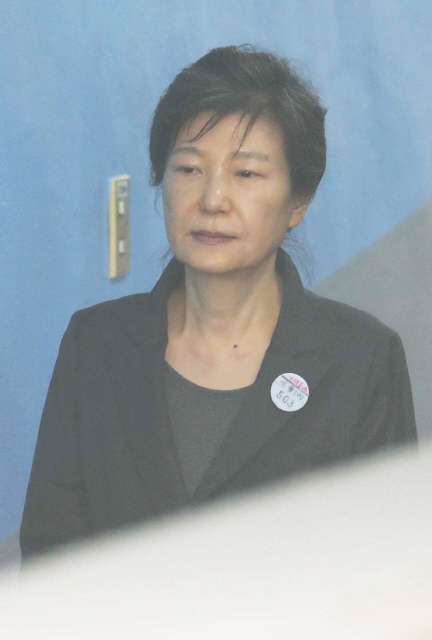Posted on : Nov.7,2017 16:03 KST
Modified on : Nov.7,2017 16:10 KST
 |
|
Former President Park Geun-hye heads to the courtroom at the Seoul Central District Court in the Seocho District to attend her trial on Oct. 10. (by Baek So-ah, staff photographer)
|
A fact-finding team found that the former president’s complaints were largely groundless
 |
|
Former President Park Geun-hye heads to the courtroom at the Seoul Central District Court in the Seocho District to attend her trial on Oct. 10. (by Baek So-ah, staff photographer)
|
After carrying out a fact-finding inquiry into allegations that former president Park Geun-hye is suffering serious human rights abuses in jail, the National Human Rights Commission of Korea (NHRCK) reportedly concluded that “there is no need for urgent measures.”
A response to these allegations, which People’s Party lawmaker Kwon Eun-hui received from the NHRCK and made available to the Hankyoreh on Nov. 6, shows that the NHRCK carried out a basic investigation of Park’s detention environment on Nov. 19 after the MH Group, which calls itself Park’s international legal team, claimed that Park is being “unfairly treated” in jail. NHRCK investigators who viewed Park’s cell reported that two windows in the outside wall of the bathroom and one window along the hall provide ventilation, that the outside windows let the light in, and that the overall environment, including the walls and the floor, is clean.
“Detainees are normally provided one floor mat per person, but [Park] was given an extra mattress when she complained about severe back pain during a meeting with the director. Because of her repeated difficulties in reading the extensive trial documents, which exceed 100,000 pages, from a seated or lying position, she was provided with a chair [with a back],” the document said.
The document also addressed the fact that Park was not provided with a bed. “The Seoul Detention Center explained that there are no grounds in South Korea’s current legislation for providing detainees with beds and that a bed cannot be provided [to Park] given the treatment of the other detainees,” the document said. In regard to the brightness of the lights, however, the document explained that the detention center “is planning to replace the 8-watt bulb in the night light with a 4-watt bulb.”
“The result of our basic investigation is that there is no need for urgent measures in regard to the treatment of the detainee,” the NHRCK said.
On Oct. 17, the MH Group claimed that Park was confined to a cold and dirty cell, that she couldn’t sleep because the light was always on, and that her medical condition was getting worse because she couldn’t sleep in a bed.
By Song Gyung-hwa, staff reporter
Please direct questions or comments to [
english@hani.co.kr]










